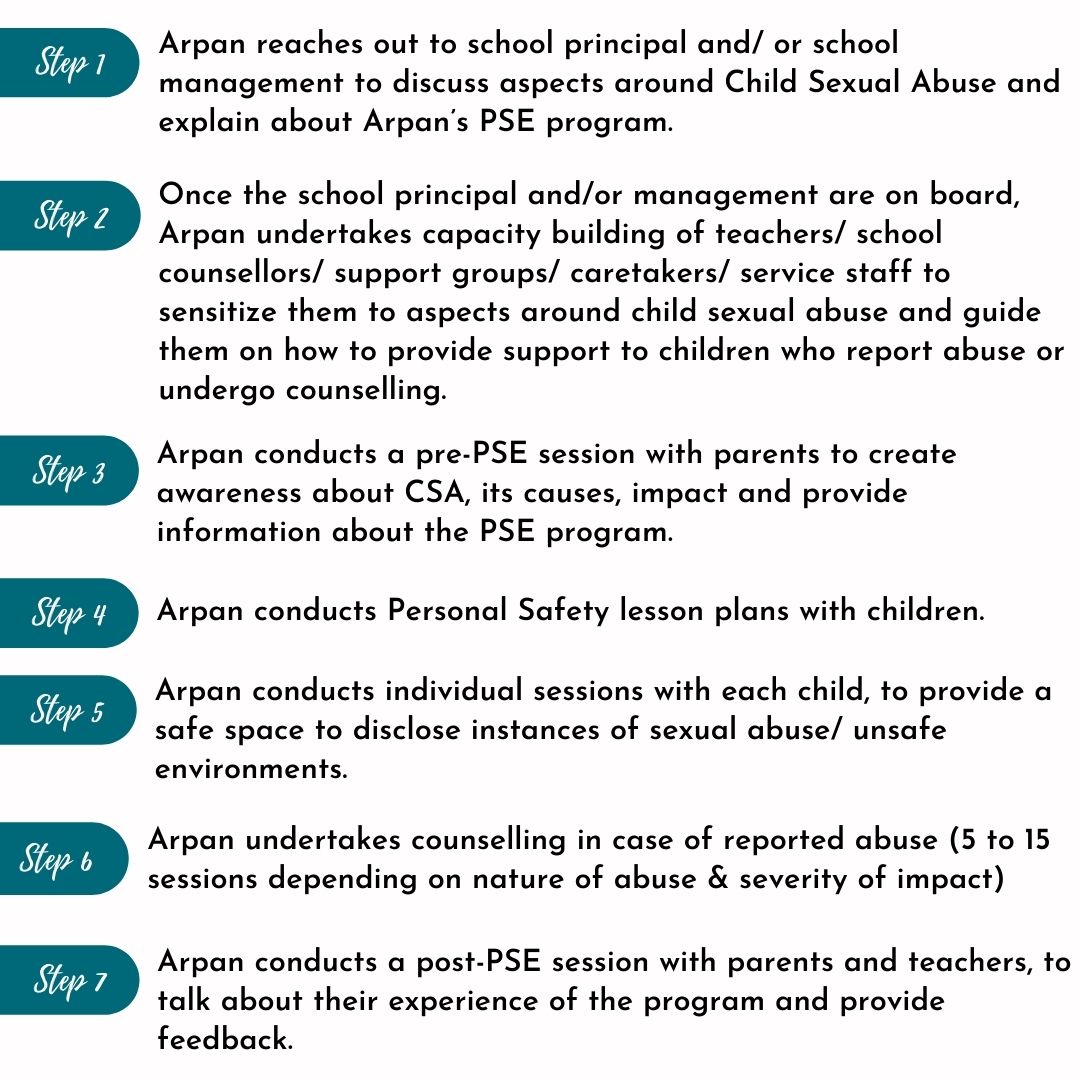Arpan’s flagship Programme
Personal Safety Education Programme
The Personal Safety Education (PSE) Programme is Arpan’s flagship programme. Personal Safety Education Programme is a comprehensive model to empower children to prevent the risk of Child Sexual Abuse (CSA) and seek support in case of violation. It (i) provides children with the knowledge and skills to prevent instances of CSA and to seek support if an incident occurs, (ii) works with adult caregivers in the child’s ecosystem (school management, teachers, parents, support staff) to sensitize them and help them create a safe environment for children, (iii) provides children a safe space for disclosure of sexual abuse/ sexual misbehavior, and, (iv) works to heal all children who disclose. This life skill education module developed by Arpan is conducted in schools, communities, institutions with both boys and girls (age 4 years to 15) to provide them with knowledge and skills to prevent instances of CSA as well as to seek support when such an incident occurs. It aims to reduce the risk factors that are likely to increase the chances of sexual abuse both online and offline by strengthening the protective factors. It is built on the core life skills of decision-making, problem-solving, critical thinking, interpersonal relationship, self-awareness, gender awareness, resilience, empathy building and de-stigmatization. It supports children with counselling post disclosure and also works with children and adolescents who violate other children’s personal boundaries. The programme also works with adult caregivers, for example, parents, teachers and service staff so that they can create a safe environment for children and respond effectively in case of violations.
The PSE programme is delivered through the existing school network in 3 districts of Maharashtra. Schools provide an audience segregated by age, enabling the delivery of age-appropriate personal safety content to children. The school system also enables approaching the same children after 2-3 years (based on age during first delivery) to conduct a “step-up” programme to reinforce key concepts and provide additional age-appropriate content.
Our Impact
We have worked with 147,130 children and 113,517 parents and teachers, non-teaching staff through Personal Safety Education (PSE) programme in over 263 schools and 4 shelter homes/institutions in 3 districts of Maharashtra.
We have conducted External and Internal evaluations of the Programme to map both short-term and long-term outcomes.
In the Short term :
- There is an immediate increase in children’s knowledge and skills towards child sexual abuse: Post-session scores on knowledge and perceived skills, are consistently higher than pre-session scores assessed through pre- and post- tests conducted on a sample set of 10-20% children.
- Disclosures of abuse by 3-8% children, most for the first time.
- Therapeutic support provided to 100% of the children who disclose.
- Healing made possible through intervention for those who disclose.
- Also, based on qualitative feedback received, there is increased and more positive communication with parents, increased confidence, alertness and self-esteem of children, and, teachers and parents are able to identify potential CSA cases based on children’s behavior change.
In the Medium to Long term :
- Increased reporting and help-seeking by children: For example:
- In an external evaluation, 60 out of 754 (8%) children reported incidents from the past 2 years, and, of these, 54 (90%) sought help from a trusted adult.
- In another case study based evaluation, out of 31 children interviewed, 9 children (29%) disclosed unsafe experiences and all 9 (100%) demonstrated assertive and help-seeking behavior.
- Knowledge retention: Knowledge retention is high and ranges from 92% to 69%, depending on the age of the child and the gap post implementation (i.e. the number of years after Arpan’s programme implementation).
- In younger children, children with a 1-year post implementation gap had the highest percentage retention (92.28 ± 5.95) as compared to children with a gap of 2-years (85.92 ± 11.89); the latter in turn indicated a higher average retention than the children with a gap of three years (82.56 ± 14.91).
- In older children, it was observed that the statistically significant decline in average scores occur as the post implementation gap increases from one year to two years. Thereafter, with each increasing year in implementation gap, the difference stops being significant. The children with a one year post implementation gap showed significantly higher retention (73.18 ± 9.33) as compared to the children with two year (70.53 ± 9.87) and three year (68.69 ± 8.87) gaps in retention.
- Qualitative evaluations have pointed out that children’s internalization of the Personal Safety Education messages boosted their self-esteem and articulation of feelings, that children across all groups were comfortable with their body, knew that their body belongs to them and believed themselves to be active participants in ensuring their own safety.
These outcomes indicate that the Personal Safety Education programme plays a key role in prevention and risk reduction of Child Sexual Abuse.
If you want us to conduct Personal Safety Education programme in your school, institution or community, you can write to us at communications@arpan.org.in or call us on +91 98190 51444

